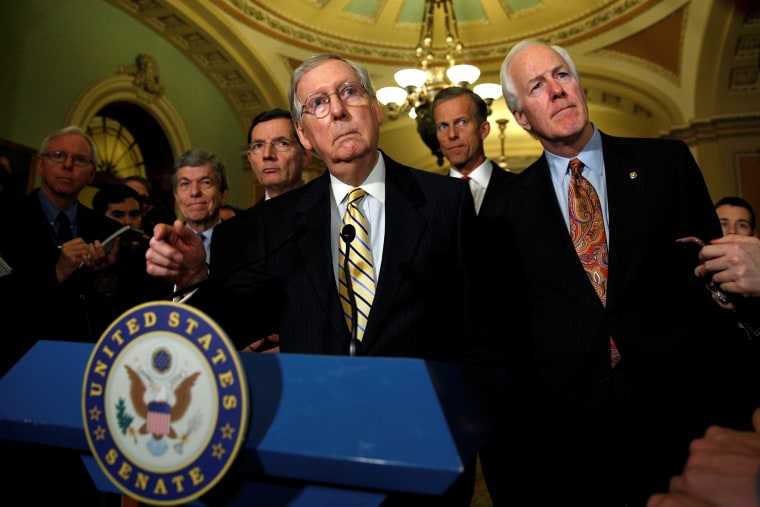As things stand, Senate Democrats continue to make expansive requests for documents from Judge Brett Kavanaugh's background before his Supreme Court nomination can continue, and Senate Republicans continue to complain that Dems are being unreasonable.
But Senate Majority Leader Mitch McConnell (R-Ky.) thinks he has the upper hand: Politico reports that the GOP leader's latest plan is to tell Democrats he'll push the confirmation vote until the fall unless they back off their document requests.
Delaying the vote past September would serve a dual purpose for McConnell, keeping vulnerable red-state Democrats off the campaign trail while potentially forcing anti-Kavanaugh liberals to swallow a demoralizing defeat just ahead of the midterms. Senators said McConnell believes the Democratic base will be "deflated" if they raise hopes of defeating Kavanaugh only to lose just days before the election. [...]"We're witnessing historic obstructionism here," Sen. David Perdue (R-Ga.) said of Democratic resistance to Trump's judicial picks....
For now, let's put aside the question of why Senate Republicans are so concerned about limiting transparency on Kavanaugh's background. Let's also look past the fact that Sen. David Perdue (R-Ga.) shouldn't make silly complaints about "historic obstructionism" after what he and his colleagues did to Merrick Garland two years ago.
Instead, let's consider the strategy on its merits, because at face value, there's some logic to what McConnell is saying. The Senate is rarely in session in October of an election year because incumbents up for re-election want to be in their home states campaigning. With so many red-state Democratic incumbents facing tough races this fall, it's likely they'd rather be on the trail than on Capitol Hill.
Republicans are also under the impression that if Kavanaugh ends up being confirmed anyway, it would have a demoralizing effect on Democratic morale right before Election Day.
But there's a flipside to this.
First, guessing how voters are likely to respond to a possible Kavanaugh confirmation is tricky. It's not hard to imagine progressive voters feeling fired up, not deflated, under such a scenario, angry about Donald Trump and his Republican allies pushing the Supreme Court so far to the right, and feeling a renewed sense of urgency about the need for a proper "resistance."
Second, McConnell's plan appears predicated on the idea that the document requests are a meaningless stalling tactic, but what if meaningful revelations emerge during the Senate's vetting process? What if members are confronted with evidence that casts Kavanaugh in a severely unflattering light, giving a GOP senator or two pause?
Indeed, for progressive activists hoping to persuade Republicans like Maine's Susan Collins and Alaska's Lisa Murkowski, having more time to make their case no doubt sounds encouraging, not discouraging.
But let's also not lose sight of the larger landscape: who knows what'll happen with the Russia scandal between now and October? What happens if, hypothetically, the president is forced to resign? What if Special Counsel Robert Mueller tries to indict Trump on criminal charges?
Such crisis conditions may seem far-fetched, and maybe they are. But they're not impossible, and were they to arise, they'd likely affect the Senate's confirmation process.
As things stand, McConnell intends to have Kavanaugh's nomination on the floor for a vote by Oct. 1. Watch this space.
